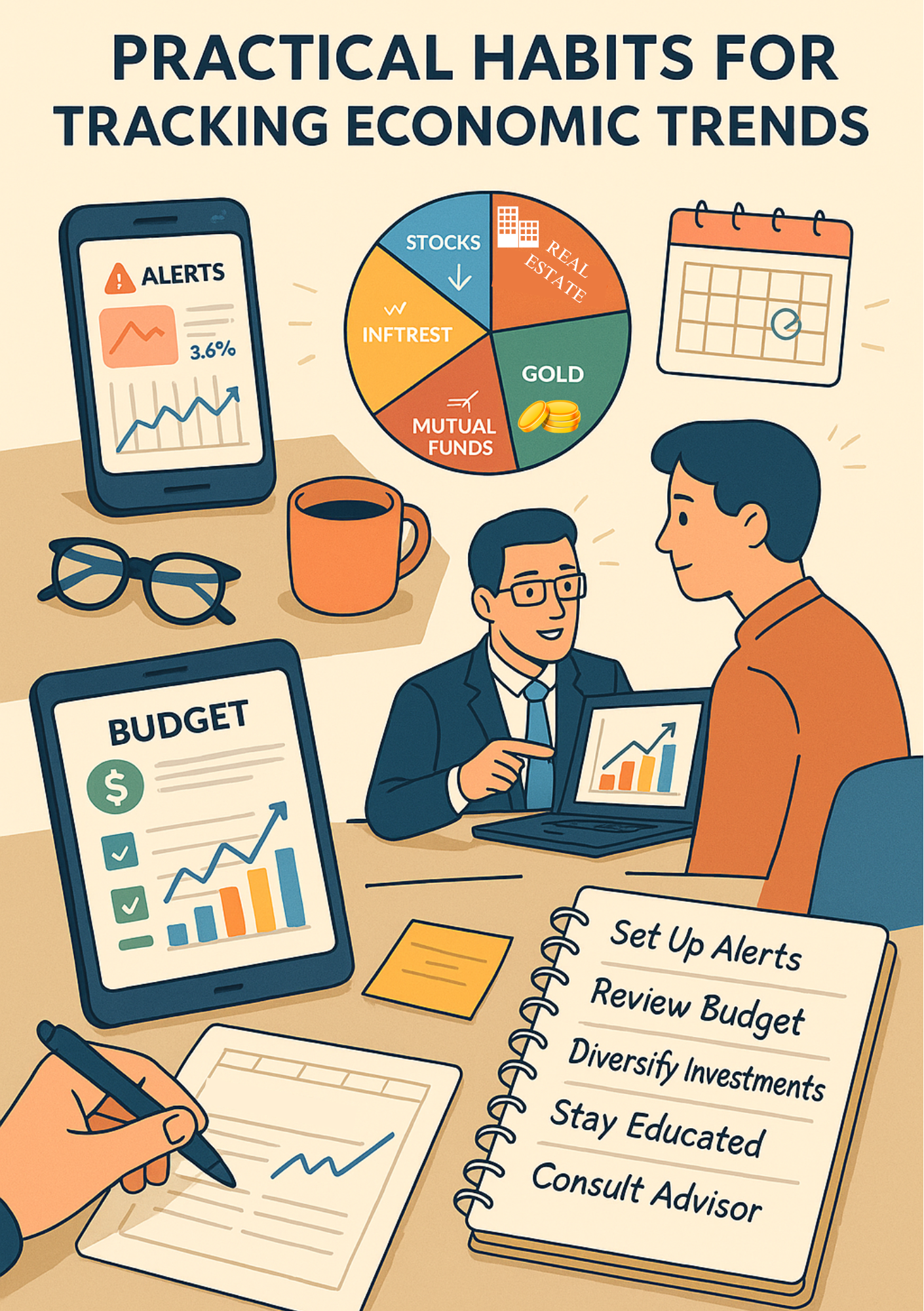In today’s fast-changing world, staying updated with current economic trends is not only essential but necessary not just for financial professional or policy makers but for anyone who wants to make smart financial decisions. No matter whether you live in India, in the US, or anywhere in the globe, being aware of what interest rates, inflation, and global events do to your personal finances can help you be better at planning, at saving, and at not wasting money. In this article, we will examine how economic trends affect your wallet, inform you about instruments and resources to track such changes, and provide you with practical habits to be one step ahead.
In this article, we’ll dive into:
- What economic trends are and why they matter
- How interest rates, inflation, and global events affect personal finances
- Practical tools and resources to help you stay informed
- Habits that help you make smarter financial decisions
Table of Contents
Why Tracking Economic Trends Matters
Economic trends are general movements in key indicators such as GDP, inflation, unemployment, interest rates, exchange rates, and international market trends, etc. These indicators offer details concerning the health of an economy and provides insights concerning potential changes in financial conditions.
Economic trends influence all aspect of your life from how much you pay for groceries to the interest on your home loans. Major shifts like rising inflation, swinging interest rates, or foreign trade disruptions can have a ripple effect that touches all aspects of your financial life. For example, a sudden hike in US interest rates, can prompt overseas investors to pull money out of Indian stock exchanges, triggering stock declines, rupee depreciation, and making loans more expensive for Indian consumers.
By keeping oneself updated, you can anticipate the changes, you can adjust your budget and can make investment decisions that will help you protect your wealth. Whether you’re planning for retirement, saving for a home, or just trying to make ends meet, understanding the economic landscape gives you a crucial edge.
Key Economic Trends That Affect Personal Finances
Let’s break down the most important economic trends and how they impact your finance.
Interest Rates:
The Cost of Money: Interest rates refer to what you pay in order to take money on loan or what you get in order to save money in bank. Central banks like the Reserve Bank of India (RBI) in India and the US Federal Reserve decide benchmark rates, which impact anything ranging from mortgage loans to deposits.
When Interests Are Growing:
Borrowing becomes more expensive. Home loan EMIs, auto loans, and personal loan payments become tighter on your monthly pocket.
Savings get a boost. Savings accounts and deposits pay higher rates, and therefore, these become all the more popular among risk-averse investors.
Stock markets may drop. Rising US interest rates may induce capital flows from emerging markets like India, creating stock volatility.
When Interest Rates Fall:
Borrowing becomes cheaper. It’s an ideal time to refinance debts or take on new debt at lower rates.
Returns on deposits decline. Savings accounts and fixed deposits pay lower, pushing investors to riskier avenues like stock or mutual funds.
Inflation: The Silent Thief
Inflation is the steady rise in the price of goods and services in the long term. It lowers your purchasing power, i.e., your money buys fewer goods than it did before, apart for this inflation directly impact on personal finance.
How Inflation Affects You:
- Less purchasing power: Everyday essentials like food, travel, and healthcare become more expensive. This forces you to spend more to maintain the same quality of life.
- Saving and retirement challenges: The value of your savings and retirement funds will depreciate in value if they do not keep pace with inflation.
- Greater cost of borrowing: Central banks tend to increase interest rates to fight inflation, increasing costs in loans.
- Effect on investments. Inflation can erode your investment income if your investment portfolio fails to achieve returns greater than the inflation rate.
International Developments and Economic uncertainties

Global events such as geopolitical tensions, trade wars, or pandemics have the potential to disrupt supply chains, trigger price movements, and slow down economic growth that have consequences at the national as well as personal finance.
- Supply Chain and Trade Disruptions: Events such as the Russia-Ukraine conflict or Iran-Israel conflict or the US-China trade conflict may lead global supply chains to get disrupted, with traded goods experiencing rising prices and reduced demand for exports. This may impact jobs, wages, and income from investment.
- Currency Fluctuations: International uncertainty causes fluctuations in the exchange rate, which affect the cost of foreign commodities, vacations, and foreign investment.
- Stock market fluctuations: Global crises create uncertainty in the market, investors loses confidence, in turn could led stock market crash, which could affect your investment portfolio.
How to Stay Updated with Economic Trends
Now that you know what the effect is, here’s how you could stay informed and make more smart financial decisions. Staying informed doesn’t mean having to read bulky economics journals. Here are friendly ways to stay informed regarding changes in economics:
Stay Up-to-Date with Reliable Sources
Reputable financial news sources offer current reports on economic trends, policy developments, and market changes. Some of the highest-rated choices are:
India: Economic Times, Mint, Business Standard
US: The Wall Street Journal, Bloomberg, CNBC
All such publications offer complimentary newsletters, mobile applications, and podcasts that are useful for remaining updated anywhere.
Monitor Central Bank Announcements
It is central banks that are critical for correcting the course of policy. Watch:
Reserve Bank of India (RBI): For interest rates, inflation targets, and monetary policy.
US Federal Reserve: For federal funds rate changes and outlook for the economy.
Nearly all central banks publish their meeting minutes, their press releases, and policy announcements on their own websites.
Use Financial Apps and Dashboards
Various websites and apps collate the data on economics and offer real-time reports:
India: Moneycontrol, ET Markets, Official RBI app
US: Yahoo Finance, MarketWatch, FRED (Federal Reserve Economic Data)
These tools have adjustable dashboards, warnings, and analysis tools that assist you in tracking what is most important.
Subscribe to Economic Research Reports
Economic forecasts and outlooks are issued periodically by firms like Deloitte, Oxford Economics, and BNP Paribas. Their reports consist of comprehensive analysis of trends, risks, and opportunities that enable you to foresee developments before they happen.
Join Financial Communities and Forums
Getting engaged with financial forums such as with Reddit’s r/personalfinance or local investment clubs can provide learning, advice, and practical points-of-view about trends in economics.
Practical Methods for Staying Current with Economic Trends
As the economic scene continues to change, developing good habits can enable you to make informed financial decisions and be a step ahead of these shifts. Here are some down-to-earth and easy measures to enable you to track economic trends effectively:
Set Up Real-Time Alerts
Stay informed by subscribing to economic news or by using services like Google Alerts and stock screens. These can notify instantly about major economic updates such as change in interest rates, inflation reports, or employment data, helping you make better decisions.

Periodically Check and Revise Your Budget
Economic trends can have an impact on everything from fuel costs to supermarket prices. We should frequently review personal or domestic budget and make sure that you alter your spending and savings behaviour accordingly depending on current market conditions.
Diversify Your Investment Portfolio
Volatility in the market is a guarantee, but you can minimize your exposure by spreading your investments in several asset classes including those of stocks, bonds, mutual funds, and even property. This cushions the blow of economic changes on your overall wealth.
Stay Financially Informed
This is time well spent on personal-finance education. Sign up for the low-cost or no-cost Internet courses, participate in webinars, or follow expert-blogger personal-finance and macroeconomic trends blogs.
Get Expert Financial Advice
Economic data can be complex and overwhelming. A certified financial planner can help you interpret market indicators and create a tailored economic plan that aligns not only with your personal goals but also with broader economic environment.
Tools and Resources to Track Economic Trends
Here’s a handy list of tools and resources for Indian and US audiences:
| Tool/Resource | India/US | Description |
| Moneycontrol | India | Financial news, market data, and analysis |
| ET Markets | India | Stock market updates and economic news |
| RBI | India | Central bank announcements and policy updates |
| Yahoo Finance | US | Stock quotes, news, and financial data |
| MarketWatch | US | Market news, analysis, and portfolio tracking |
| FRED | US | Federal Reserve economic data and charts |
| Deloitte Reports | Both | Economic outlooks and forecasts |
| Oxford Economics | Both | Global and regional economic analysis |
| BNP Paribas Research | Both | Economic scenario forecasts and insights |
Tips to Protect Your Finances from Economic Shocks
Economic uncertainty may strike any moment. An informative approach and being prepared is your best defence. Use these smart financial tips to stay secure during downturns:
- Build an Emergency Fund: A must-have, keep ideally between 3 to 6 months’ worth of core expenses set aside as your emergency fund against instances like job loss, medical emergencies, or market crashes.
- Increase Inflation-Type Assets: Build your wealth using assets that overpower inflation; stocks, real estate, or inflation-adjusted bonds, and it is how you protect your purchasing power.
- Refinance High-Interest Debt: If interest rates have dropped, use it to your advantage. Refinance to pay less-of a higher interest rate-and thus lighten your financial burden per month.
- Stay Financially Flexible: Be ready to alter your budgeting and investment strategy whenever there are changes in the economic condition.
- Monitor Currency Exchange Rates: Exchange rates should be kept under review if you send money abroad or travel away. It might safeguard you from unnecessary losses or depreciation.
The Role of Financial Literacy
Understanding economic trends is just one aspect in the game. Financial literacy, whether is managing money, setting up a budget, investing, or planning for the future-is equally important. With proper knowledge and staying informed with current economic trends, you will be able to make financial decisions confidently and with self-determination that will safeguard and augment your wealth.
Final Thought: Take Control of Your Financial Future
Staying updated on economic trends is paramount for anyone aiming to have a say in their personal finances. Whether you are in India or in the US, any change in interest rates, inflation rate, or global events can make drastic changes into your budgets, savings, and investments. By following trustworthy news portals, employing financial tools, and developing good habits, one will manage to stay ahead-of-time financially. Always remember that knowledge is power, more so when it comes to money.
FAQ
What’s an easy way of updating oneself on economic trends?
To get updated, mix-news apps like Mint or CNBC, follow LinkedIn pages of some experts, and set a Google alert for keywords such as inflation or repo rate.
How does inflation affect long-term savings?
If inflation beats your returns, then your savings lose value with time. That is why it is necessary to make investments that beat inflation.
Should I stop investing during a recession?
Not necessarily. Recessions often provide great long-term buying opportunities. Continue your SIPs unless you require liquidity.
How do global news events affect Indian stock markets?
The U.S. rate hikes, for instance, tend to introduce volatility in Indian markets by way of Foreign Portfolio Investment (FPI) outflows, the prices of commodities, and the valuation of currencies fluctuates.



